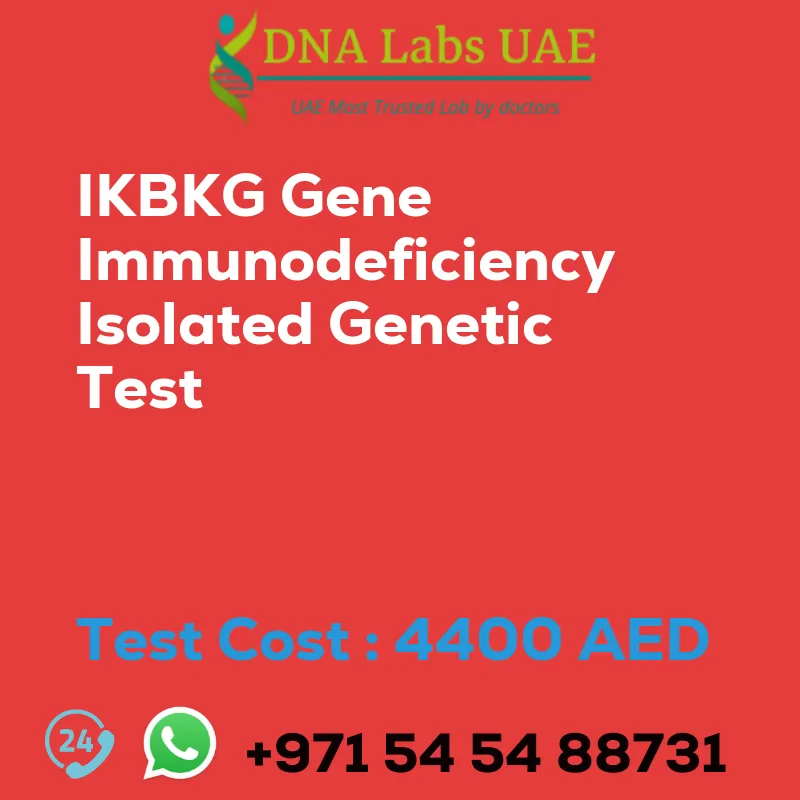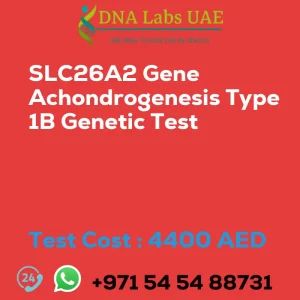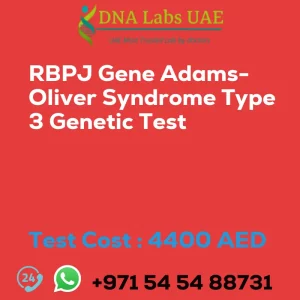IKBKG Gene Immunodeficiency isolated Genetic Test
Test Name: IKBKG Gene Immunodeficiency isolated Genetic Test
Components:
- Price: 4400.0 AED
- Sample Condition: Blood or Extracted DNA or One drop Blood on FTA Card
- Report Delivery: 3 to 4 Weeks
- Method: NGS Technology
- Test type: Osteology Dermatology Immunology Disorders
Doctor:
Dermatologist
Test Department:
Genetics
Pre Test Information:
Clinical History of Patient who is going for IKBKG Gene Immunodeficiency, isolated NGS Genetic DNA Test. A Genetic Counselling session to draw a pedigree chart of family members affected with IKBKG Gene Immunodeficiency, isolated NGS Genetic DNA Test gene IKBKG
Test Details:
IKBKG gene immunodeficiency, also known as incontinentia pigmenti (IP), is a rare genetic disorder that primarily affects the skin, hair, teeth, and central nervous system. It is caused by mutations in the IKBKG gene, which is responsible for producing a protein called NEMO (NF-kappa-B essential modulator).
Isolated NGS (Next-Generation Sequencing) genetic testing refers to a type of genetic test that uses advanced sequencing technologies to analyze multiple genes simultaneously. In the case of IKBKG gene immunodeficiency, isolated NGS genetic testing can be used to identify mutations in the IKBKG gene that are associated with the condition.
This type of genetic testing involves obtaining a DNA sample from the individual being tested, typically through a blood or saliva sample. The DNA is then sequenced using NGS technology to identify any mutations or variations in the IKBKG gene.
The results of the test can help diagnose IKBKG gene immunodeficiency and provide information about the specific genetic variant(s) present. Isolated NGS genetic testing can be beneficial in several ways. It allows for the analysis of multiple genes simultaneously, which can help identify other potential genetic causes of immunodeficiency if the IKBKG gene is not mutated. Additionally, it can provide information about the specific mutation(s) present in the IKBKG gene, which can be useful for predicting disease severity and guiding treatment decisions.
It is important to note that genetic testing for IKBKG gene immunodeficiency should be performed and interpreted by a qualified healthcare professional or genetic counselor. They can help explain the results, provide appropriate counseling, and guide further management and treatment options.
| Test Name | IKBKG Gene Immunodeficiency isolated Genetic Test |
|---|---|
| Components | |
| Price | 4400.0 AED |
| Sample Condition | Blood or Extracted DNA or One drop Blood on FTA Card |
| Report Delivery | 3 to 4 Weeks |
| Method | NGS Technology |
| Test type | Osteology Dermatology Immunology Disorders |
| Doctor | Dermatologist |
| Test Department: | Genetics |
| Pre Test Information | Clinical History of Patient who is going for IKBKG Gene Immunodeficiency, isolated NGS Genetic DNA Test. A Genetic Counselling session to draw a pedigree chart of family members affected with IKBKG Gene Immunodeficiency, isolated NGS Genetic DNA Test gene IKBKG |
| Test Details |
IKBKG gene immunodeficiency, also known as incontinentia pigmenti (IP), is a rare genetic disorder that primarily affects the skin, hair, teeth, and central nervous system. It is caused by mutations in the IKBKG gene, which is responsible for producing a protein called NEMO (NF-kappa-B essential modulator). Isolated NGS (Next-Generation Sequencing) genetic testing refers to a type of genetic test that uses advanced sequencing technologies to analyze multiple genes simultaneously. In the case of IKBKG gene immunodeficiency, isolated NGS genetic testing can be used to identify mutations in the IKBKG gene that are associated with the condition. This type of genetic testing involves obtaining a DNA sample from the individual being tested, typically through a blood or saliva sample. The DNA is then sequenced using NGS technology to identify any mutations or variations in the IKBKG gene. The results of the test can help diagnose IKBKG gene immunodeficiency and provide information about the specific genetic variant(s) present. Isolated NGS genetic testing can be beneficial in several ways. It allows for the analysis of multiple genes simultaneously, which can help identify other potential genetic causes of immunodeficiency if the IKBKG gene is not mutated. Additionally, it can provide information about the specific mutation(s) present in the IKBKG gene, which can be useful for predicting disease severity and guiding treatment decisions. It is important to note that genetic testing for IKBKG gene immunodeficiency should be performed and interpreted by a qualified healthcare professional or genetic counselor. They can help explain the results, provide appropriate counseling, and guide further management and treatment options. |








